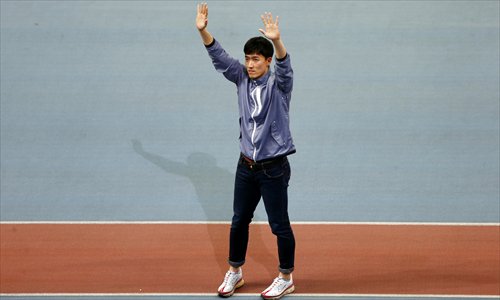Where have all the Chinese superstars gone?
New generation have failed to make splashes worldwide

Liu Xiang waves to the crowd during his retirement ceremony at the 2015 IAAF Diamond League Track and Field meet in Shanghai on May 17. Photo: CFP
A decade ago, Chinese athletes were commonplace in global advertising campaigns. Yao Ming dominated in the NBA, Liu Xiang tore competitors apart on the track, Ding Junhui was one of the best in the world in snooker, and it was hoped that Dong Fangzhuo would soon kick up a storm at Manchester United. Today, of these, only Ding is still making some waves, whereas the others have retired or faded. Where China still dominates in diving or badminton, this is seen as par for the course.
What is stopping its new generation of athletes from becoming global brands as their predecessors were? Let us look at the examples of arguably the two best-known Chinese athletes around the world.
Two best-known athletes
First of all, let us put to bed the myth that talent alone carried the likes of Yao and Liu to planetary recognition. Plenty of top athletes have had all the talent in the world but have not taken that step to becoming brands. For Yao and Liu, success also came from their marketability and particular status. Good-looking and media friendly, Liu easily impressed people off the track. Easily recognizable and with an easy sense of humor, Yao quickly garnered the attention of NBA fans around the world.
Second, Yao and Liu found great success in sports where Chinese athletes had traditionally not been among the elite. Yao may not have been the first Chinese player in the NBA but he outperformed Wang Zhizhi by being the first pick in the 2002 draft and becoming an eight-time All-Star. Liu won consistently on the track, winning China its first track and field gold medal in 2004. This uniqueness soon helped them net the sponsors they needed. Liu has been backed by Nike for years and the company even named a building at its Chinese headquarters after him. In 2011, Yao was named the 11th most marketable athlete in the world, having made over $34 million in 2010, thanks to sponsorships from Apple, Visa, McDonald's and Reebok.
This originality helped them stand out in another important way from Chinese athletes. In diving, swimming, badminton and table tennis, Chinese victories are simply part of the landscape. Certain rivalries have played out such as Lin Dan's battles with Malaysia's Lee Chong Wei but these are few and far between. Among Chinese champions in these disciplines, two attributes can lead to success at home, if not abroad. Either they win for a long time, such as Lin, or their looks are a major help, such as Guo Jingjing. If athletes are not blessed with such longevity or charisma, their names may soon find themselves forgotten. While Chinese hard-core fans may long hail the diving exploits of Chen Ruolin and Qiu Bo, their names will not long echo on the international scenes.
The system
Another burden that Chinese champions have to bear is ironically the weapon that helped them become champions. The Chinese sporting system is extremely rigorous, picking young talents and grooming them for gold over years. While this system has been heavily criticized for its training regimen, it has also stopped athletes from blossoming as individuals. The most famous example of an athlete showing frustration with these restrictions was tennis star Li Na. After winning her, and China's, first Grand Slam tournament in 2011, she was pilloried for failing to thank her country in her victory speech. While she apologized, Li was never a prolific praiser of China's training system. Ironically, this helped her career and fanbase blossom at home, with over 23 million people following her on Weibo.
Li's example brings up a final point. One of the major attributes athletes have in building their own brands is their ability to control their online presence. Opening up a personal image website and being active on social media help athletes create a reputation that is separate from sporting achievements yet equally important to connect with fans. Li's a rebel, Liu worked his way back from redemption, Yao is goofy and is used in memes, Lin's abs speak for themselves.
Until Chinese athletes can find ways to express themselves in unique and creative ways, the country may have to accept that only once-in-a-generation talents will climb those summits of fame.